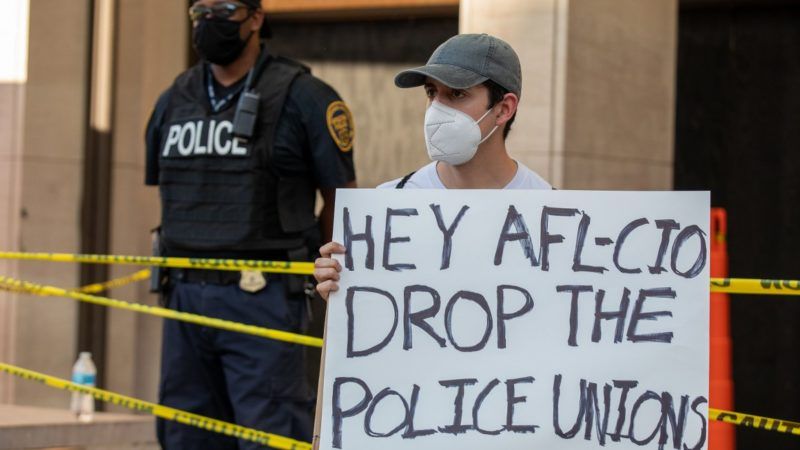Will Big Labor Give the Boot to Police Unions? Be Skeptical.
Union leaders show very little interest in considering collective bargaining’s role in protecting bad cops.

Since they grew into power in the second half of the 20th century, police unions have become a dominant force in politics, pushing for increased government spending on law enforcement and for the implementation of workplace policies that protect individual officers from the consequences of their misconduct.
The national protests sparked by the police killing of George Floyd have caused more and more people to question of the wisdom of allowing police officers to form unions in the first place. After all, police unions don't just negotiate wages and represent officers in disciplinary hearings; they push for union contracts that protect officers from the consequences of bad behavior that would get any other class of worker fired or even thrown in prison. One study shows that while police unions may raise the wages of officers, they don't actually result in better policing or safer neighborhoods.
So now is the perfect time to get rid of police unions once and for all. But if you're looking for other labor unions to join the cause, think again.
The Center for Public Integrity, a nonprofit media outlet that investigates the influence of money in politics, attempted to interview the leaders of 10 major labor union groups in the aftermath of Floyd's killing, only to find silence. Time and time again, reporter Alexia Fernandez Campbell was told that those leaders didn't have time to talk to her.
AFL-CIO President Richard Trumka has publicly condemned Floyd's killing, but he also still defends police unions and does not appear willing to consider ejecting them from his organization. In an interview with Bloomberg News, Trumka insisted that "collective bargaining is not the enemy."
But as Campbell notes in her reporting, and as Reason has noted repeatedly for years now, collective bargaining in the hands of public sector unions has, in fact, emerged as a big enemy of transparency and accountability. Collective bargaining has led to policies that purge personnel records of police misconduct after a certain amount of time; that require long waits before officers can be interviewed about misconduct allegations made against them; and that create lengthy appeals processes that end up putting cops who have been fired for bad behavior right back on the force.
It's not just the police who use union collective bargaining to shield themselves. The teachers unions do it, too. Indeed, it's almost impossible to fire bad teachers. So perhaps it should come as no surprise that the teachers unions are are not terribly interested in addressing the role of collective bargaining in protecting bad cops.
Instead, the American Federation of Teachers and the National Education Association—the two top national education unions—support the types of police reforms congressional Democrats introduced yesterday. And many of those reforms are indeed good and should be supported, such as reforming qualified immunity; creating a national registry to keep track of officers fired for misconduct; banning police choke holds and limiting the use of no-knock raids; and requiring federal officers to wear body cameras.
But as Reason's C.J. Ciaramella noted yesterday in his report on the Democratic proposal, the measure won't mean much in practice if the police can't actually be held accountable and fired when they engage in misconduct. Remember that it took five years for New York City to hold Officer Leo Pantaleo responsible for killing Eric Garner. The city had to fight the police union every step of the way and now Pantaleo is suing (with union support) to get his job back.
The Minnesota AFL-CIO has called for the ouster of Lt. Bob Kroll, the president of the Police Officers Federation of Minneapolis, over his vocal defense of the officers involved in the Floyd arrest, as well as his description of people protesting police behavior as "terrorists" and his complaints that the city didn't let police crack down even more violently on protesters.
However, to call for Kroll's resignation suggests that his behavior is out of the ordinary for a police union leader—it isn't. His conduct is part of a lengthy history of police unions across the country attacking the public for criticizing or trying to reform police misconduct. Kroll's thuggish attitude is not an anomaly. The union built him this way. It is how police unions behave—the problem is always the public, never them.
At least one union is willing to rethink its ties to the police. The Writers Guild of America, East, which is an affiliate of the AFL-CIO, is now calling for the AFL-CIO to boot out the International Union of Police Associations, which represents more than 100,000 law enforcement officers. But outside of that, there is little evidence that organized labor is willing to grapple with the truly pernicious role that police unions wielding collective bargaining powers have played in letting law enforcement run roughshod over the rights of citizens.


Show Comments (54)